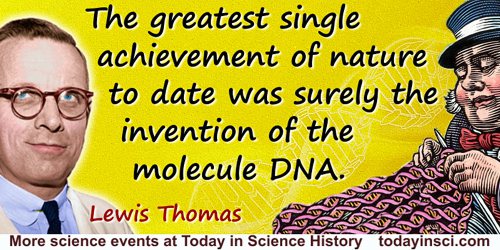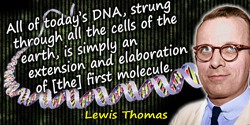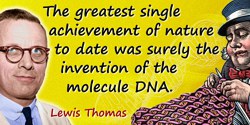 (source)
(source)
|
Lewis Thomas
(25 Nov 1913 - 3 Dec 1993)
American physician and author best known for his reflective essays on a wide range of topics in biology.
|
Lewis Thomas Quotes on Nature (9 quotes)
>> Click for 61 Science Quotes by Lewis Thomas
>> Click for Lewis Thomas Quotes on | Ant | DNA | Error | Gene | Knowledge | Language | Learning | Life | Mind | New | Science | Species | Truth | Universe |
>> Click for 61 Science Quotes by Lewis Thomas
>> Click for Lewis Thomas Quotes on | Ant | DNA | Error | Gene | Knowledge | Language | Learning | Life | Mind | New | Science | Species | Truth | Universe |
If we have learned anything at all in this century, it is that all new technologies will be put to use, sooner or later, for better or worse, as it is in our nature to do
— Lewis Thomas
In 'Autonomy', The Lives of a Cell: Notes of a Biology Watcher (1974), 79.
It is the very strangeness of nature that makes science engrossing. That ought to be at the center of science teaching. There are more than seven-times-seven types of ambiguity in science, awaiting analysis. The poetry of Wallace Stevens is crystal-clear alongside the genetic code.
— Lewis Thomas
In Late Night Thoughts on Listening to Mahler's Ninth Symphony(1984), 209.
Montaigne simply turns his mind loose and writes whatever he feels like writing. Mostly, he wants to say that reason is not a special, unique gift of human beings, marking us off from the rest of nature.
— Lewis Thomas
In The Medusa and the Snail: More Notes of a Biology Watcher (1974, 1979), 147.
The central task of science is to arrive, stage by stage, at a clearer comprehension of nature, but this does not mean, as it is sometimes claimed to mean, a search for mastery over nature.
— Lewis Thomas
In Late Night Thoughts on Listening to Mahler's Ninth Symphony(1984), 153.
The greatest single achievement of nature to date was surely the invention of the molecule DNA.
— Lewis Thomas
In The Medusa and the Snail: More Notes of a Biology Watcher (1974, 1979), 27.
The only solid piece of scientific truth about which I feel totally confident is that we are profoundly ignorant about nature. ... It is this sudden confrontation with the depth and scope of ignorance that represents the most significant contribution of twentieth-century science to the human intellect.
— Lewis Thomas
In Medusa and the Snail: More Notes of a Biology Watcher (1974, 1979), 58.
We are a spectacular, splendid manifestation of life. We have language… We have affection. We have genes for usefulness, and usefulness is about as close to a “common goal” for all of nature as I can guess at.
— Lewis Thomas
In The Medusa and the Snail: More Notes of a Biology Watcher (1974, 1995), 16-17.
We are profoundly ignorant about nature. Indeed, I regard this as the major discovery of the past hundred years of biology. It is, in its way, an illuminating piece of news.
— Lewis Thomas
Essay, 'The Hazards of Science', collected in The Medusa and the Snail: More Notes of a Biology Watcher (1979), 73.
We have dominated and overruled nature, and from now on the earth is ours, a kitchen garden until we learn to make our own chlorophyll and float it out in the sun inside plastic mebranes. We will build Scarsdale on Mount Everest.
— Lewis Thomas
In The Medusa and the Snail: More Notes of a Biology Watcher (1974, 1979), 108.
See also:
- 25 Nov - short biography, births, deaths and events on date of Thomas's birth.
- The Lives of a Cell: Notes of a Biology Watcher, by Lewis Thomas. - book suggestion.
- Booklist for Lewis Thomas.




 In science it often happens that scientists say, 'You know that's a really good argument; my position is mistaken,' and then they would actually change their minds and you never hear that old view from them again. They really do it. It doesn't happen as often as it should, because scientists are human and change is sometimes painful. But it happens every day. I cannot recall the last time something like that happened in politics or religion.
(1987) --
In science it often happens that scientists say, 'You know that's a really good argument; my position is mistaken,' and then they would actually change their minds and you never hear that old view from them again. They really do it. It doesn't happen as often as it should, because scientists are human and change is sometimes painful. But it happens every day. I cannot recall the last time something like that happened in politics or religion.
(1987) -- 


